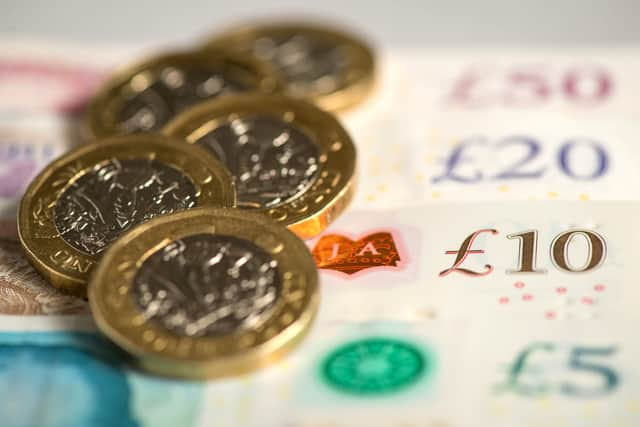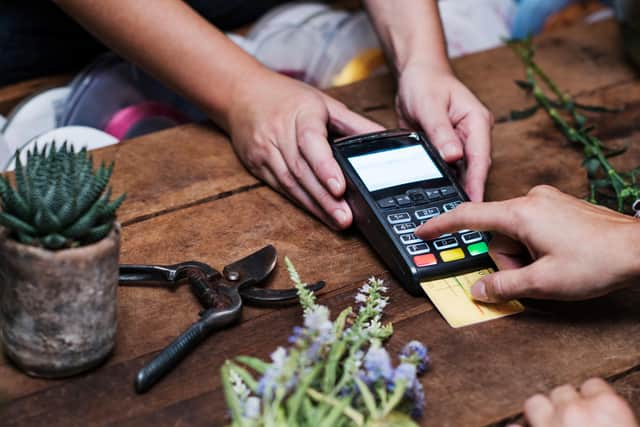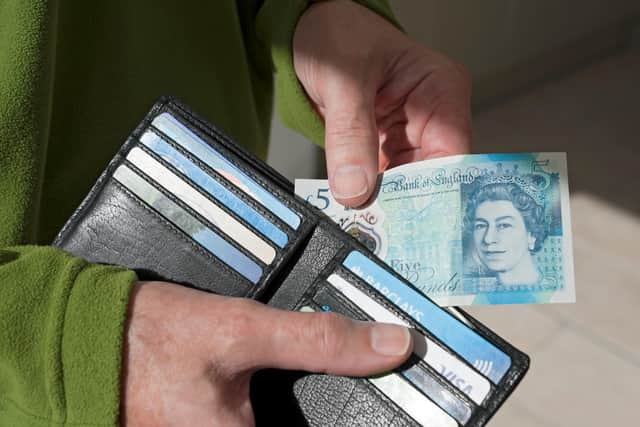Cashless society: should the UK replace cash with digital transactions for good?
This article contains affiliate links. We may earn a small commission on items purchased through this article, but that does not affect our editorial judgement.
and live on Freeview channel 276
Contactless and mobile payments have increased significantly since the start of the Covid-19 pandemic.
There were 1.8 billion debit and credit card transactions in the UK in June, 42.4% more than in June 2020, and 15.8% more than June 2019.
Advertisement
Hide AdAdvertisement
Hide AdThe convenience of paying by card, as well as the hygienic factor of not using cash, has changed the way many now pay for items.
However, there are concerns that the UK is ‘sleepwalking’ into a cashless society without considering the implications it will have on many people, particularly the elderly.
NationalWorld has interviewed campaigners who want to both save and ditch cash, as well as a privacy expert, to understand what it would mean if the UK was to become a cashless society.
Why is cash important?
The Post Office set up the ‘Save our Cash’ campaign in June last year to raise awareness of the importance of cash in society.
Advertisement
Hide AdAdvertisement
Hide AdRoss Borkett, Head of Banking Services, told NationalWorld that more than eight million people said that they would struggle without cash and many revealed that they did not have a bank account.
“An astonishing 1.4 million people, the equivalent of the population of Birmingham, do not even have a bank account. We cannot forget those across the country who continue to rely on cash – from the millions of small businesses to ordinary people who use cash to budget, save and survive,” Mr Borkett said.
He added: “For these people, cash is a lifeline that makes their day-to-day possible. Without cash, they are lost.”


Mr Borkett said a cashless society would impact vulnerable people, those in rural communities and small businesses.
Advertisement
Hide AdAdvertisement
Hide AdHe added: “Remote and rural communities in particular rely on cash and their local post office to avoid being cut off and isolated.
“Cash underpins millions of small businesses – where cash-in-hand remains the default means of payment.”
Natalie Ceeney, chair of the Access to Cash review, told NationalWorld: “I have had personal letters from people who haven’t been able to use their local leisure centre because it has gone cashless.”
“What we are going to do if we aren’t careful is to exclude the vulnerable,” she added.
Advertisement
Hide AdAdvertisement
Hide AdThe consumer group Which? also have their ‘Freedom to Pay’ campaign which aims to stop the financial exclusion of customers. Gareth Shaw, Head of Money, said that “many rely on cash as their only option.”
Four in 10 people with a disability in Which’s survey said bank branch closures had a negative impact on their ability to access bank services, rising to more than half for NatWest customers and nearly six in 10 for Barclays customers.
Mr Shaw added that cash is “a vital backup when digital payment systems fail” and worries the “transition is going ahead without proper thought.”
Would we have any privacy in a cashless society?
Andreas Theodorou, privacy expert at ProPrivacy, said: “If we allow for invasive cash surveillance, every expenditure will suddenly be under vicious governmental scrutiny, and without constant maintenance and fortification, cashless societies could see a rise in more damaging financial exploitation.”
Advertisement
Hide AdAdvertisement
Hide AdIn the current cash climate people do have some privacy in how they spend their money. However, this would change under a cashless society.


“If I were to use a card or digital currency, that purchase is suddenly traceable back to me. As we move to a cashless society, we will see the dwindling of such privacies as a natural by-product,” said Mr Theodorou.
The question on privacy is disputed as a “red herring” by Jon Levenson, campaign director of Go Cashless - promoting the end of cash in the UK by 2025.
“Shopping habits, social media, the internet, GCHQ surveillance, town centre CCTV” are all forms of surveillance and so “everyone is already being monitored,” Mr Levenson said.
Would our security decrease?
Advertisement
Hide AdAdvertisement
Hide AdIn 2020, the number of confirmed fraud cases increased, rising by four percent to over 2.8 million cases, according to UK Finance 2021 fraud data.
Online fraud has increased since the start of the pandemic, with impersonation, health, romance and parcel scams widespread.
In a cashless society “we would likely see a rise in digital crime, as mugging moves to a more digital norm,” Mr Theodorou said.
“We’re already seeing exponential increases in fraud, scams, and the continued underfunding of dedicated police task forces means that we are losing the war on fraud,” he added.


Advertisement
Hide AdAdvertisement
Hide AdHowever, despite the increase in fraudulent activity, Mr Theodorou said: “The majority of people utilise online banking without issue and cash can just as easily be forged.”
“Whether money is physical or digital, people will still try to abuse it,” he added.
What are the benefits of a cashless society?
Mr Levenson believes strongly that the UK will be better off as a cashless society, he said: “Cash is dirty, it is the currency of choice for criminals, terrorists, drug dealers and tax evaders.
“If cash was invented today nobody would think it was a good idea.”
Advertisement
Hide AdAdvertisement
Hide AdMr Levenson argues that there would be less illegal activity as cash is used by criminals and tax cheats.
He said: “In a cashless society, those who currently use cash to evade tax actually did pay tax together with a huge reduction in crime, the UK economy could see an annual boost of at least £20 billion.
“Only dishonest people should fear a cashless UK.”
Charities could also benefit. Oxfam, NSPCC and The Royal British Legion trialled contactless card payment donations and “all found the average donations by contactless cards were triple those of cash.”
Mr Levenson also said a cashless society is for everyone including the elderly as payment systems have already changed.
Advertisement
Hide AdAdvertisement
Hide AdHe said: “They no longer take their pension book to the Post Office to get it stamped and then given cash. DWP pays pensions electronically directly into pensioners’ banks who then need to use a card and pin number to make purchases or use an ATM.”
Should we be mindful of how we purchase items?
Despite potential benefits of a cashless society we should be mindful of how society could change if cash was to disappear, Mr Theodorou said.
People should “not be complacent in just accepting all terms, conditions and exploitations for the sake of convenience,” he added.
It is clear cash is vital to a range of people in society with many dependent on it. But is it possible for people to adapt to new payment systems as the world around us evolves?
Advertisement
Hide AdAdvertisement
Hide AdMr Borkett said: “While digital innovations can make life easier for many of us, we must make sure no one is left behind. And the truth is that the UK is not yet ready to be a cashless society.”
A message from the editor:
Thank you for reading. NationalWorld is a new national news brand, produced by a team of journalists, editors, video producers and designers who live and work across the UK. Find out more about who’s who in the team, and our editorial values. We want to start a community among our readers, so please follow us on Facebook, Twitter and Instagram, and keep the conversation going. You can also sign up to our newsletters and get a curated selection of our best reads to your inbox every day.
Comment Guidelines
National World encourages reader discussion on our stories. User feedback, insights and back-and-forth exchanges add a rich layer of context to reporting. Please review our Community Guidelines before commenting.
